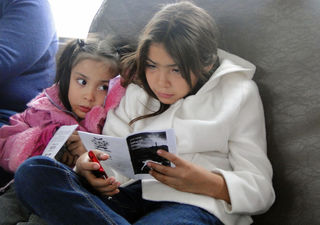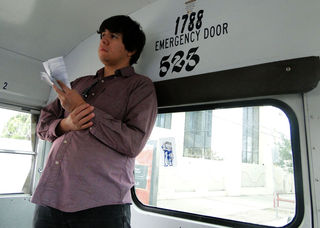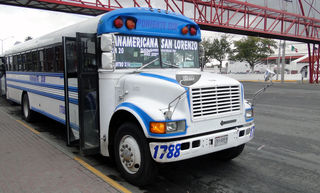CIUDAD JUÁREZ—Every fifteen days Edgar Rincón and his wife Verónica Martínez along with their two children Diego y Elena, walk towards the footbridge in front of Plaza Juárez Mall, to wait for the ruta, the city’s public transportation.
This might seem like an everyday event in Juárez, a place where most of the people use rutas as their main form of transportation, except that when the Rincón Martínez family gets on the bus, they distribute free booklets that contain poems and stories that later they read aloud.
En Espanol: Hoja de Ruta le trae cultura a ciudad Juárez
“—Hey you up there, Ignacio, tell me if you can not hear a sign of something or see some light somewhere—” Martínez, 42, proclaimed when reading the story, Do you hear the dogs barking? from Mexican writer Juan Rulfo to a diverse group of passengers.
“We are surprised to see children, men, everybody, very interested in the reading,” Martínez said.

What Rincón and Martínez do along their family and other young people is part of the Hoja de Ruta project, an initiative from Juárez that promotes literature and reading through readings in buses that are complemented by the distribution of booklets.
The project started at the end of 2011, during one of the most violent periods in the city’s history as a consequence of the drug wars. The concept was born in a writers’ meeting organized by Rincón, who is also a writer.
“The plan was to generate a permanent program,” Rincón said.
Nine or more people usually distribute the booklets. Every two weeks, they divide into three groups and go on different rutas, stopping in places such as Rio Grande Mall and Hipermart San Lorenzo. The groups distribute the 500 booklets that are printed for the Sunday outings every two weeks.
“Mother’s day poems occur in May; children stories happen in April; Christmas stories are next in December because we have to try to be in sync with people’s moods,” said Rincón, who is in charge of choosing the texts for the booklets and designing the covers.
The booklets are printed and assembled in the Hoja de Ruta Library, a community library owned by Rincón and Martínez on the Manuel Anguiano and Justino Cornejo streets in the Infonavit Casas Grandes.
“The young people who participate in the Sunday readings reunite in there,” Martínez who is in charge of the booklet administration said. “They help us with the making of the booklets as well.”

Since the beginning, the initiative has been financed by Rincón and Martínez. The production of the 500 booklets that are distributed every fifteen days costs an average of 340 pesos (25 dollars with the current exchange rate). This year, even though the initiative has received support from the governmental program, Programa de Apoyo a Culturas Municipales y Comunitarias (PACMYC), that aid will end in January 2015 and Rincón and Martínez will go back to funding the project out of their pocket.
“It’s economical because we absorb all the costs of production: Editing, design and assembly of the booklet. If we didn’t, the cost would be very high,” Rincón said.
At present, 30,000 booklets have been distributed throughout the city and 40 authors of poems and stories have been published; not just Latin-American authors but writers from all over the world.
“This year we have been working on publishing authors from Juárez because it’s important for me that Juarenses are familiar with their authors and that they read them,” Rincón said.
Conducting the readings on the city’s public transportation system helps reach all kinds of people, from homemakers to students; from elderly people to people with different jobs, he said.
“I constantly insist that is a way of democratizing literature,” Rincón said when explaining that many people think that literature is not for children or for people with a low level of education. “Literature is for everybody, as well as reading. That’s why la rutera is our work field.”

Hoja de Ruta has approached various middle schools and high schools in order to promote the cause and to encourage young people to join. They have also attended the city’s cultural events, where they have met people who eventually joined the initiative.
“At that time, I felt I had to do something for reading and for Juárez and I thought that the fact that they get on the bus to read was a very good idea,” said Michell Vázquez, 22, a young writer and middle school teacher who joined the cause after hearing the proposal at a meeting of Writers for Juárez.
“Being in the ruta where [passengers] have downtime, it reaches them when they don’t have a choice; they have to listen,” Vázquez said. “It gives them a proximity to reading.”
Vázquez has seen how Rincón’s and Martínez’ persistence is what has kept the initiative afloat.
“Although people may not come, or only a few come, they are there with different texts,” Vázquez said.
Rincón and Martinez have made Hoja de Ruta a close-knit group where young people feel part of a big family.
“They are trustworthy and they are always there for you,” said Leonel Chávez, 22, a law student and local rapper who joined the group when he met Rincón and Martínez in a “poetry slam”; a poetry contest in which he participated. “You feel the support from day one.”
Chávez said he participates in the group because he prefers “to say that I’m doing something” instead of just complaining about what is wrong in Juárez.
As with the other members, the initiative has been rewarding for Rincón and Martínez, not only because they are able to provide a form of entertainment to the passengers of the rutas, but also because they are contributing to a cause, which offers young people a space where they can have a voice and be heard.
“For us, it means that we are doing something good because in these six years of Calderón’s presidency, we easily lost two generations of young people” Rincón said. “I do not want to contribute to lose another.”

For: Fredesvinda Rojas, Edgar Rincón and Verónica Martínez
Fuerza Mundial and the International Tribunal of Conscience, will partner for the 2nd Annual gathering, Pueblos en Movimiento, this March 2015, in part with the Institute for Social Justice and other academic programs at NMSU, and would appreciate contact numbers so that we may request a special convening for adding this to our crossborder itinerary as a special delegation that also from Saltillo, Coahuila, FIC Kikapoo/Catedra Sal de la tierra, Indigenous film project.
We are interested in supporting, reading, and hopefully assisting towards the development of a guest publication if that could be arranged in helping to kick off the 2nd Annuel FIC Kikapoo Film Fest that will focus on Los Otros Dreamers from Mexico and Dreamers, U.S., Migrant and Displaced communities.
Thank you for your superb and imperative coverage of border issues.
In Solidarity,
Dorinda Moreno (805 934-3884)
What a wonderful, inspired service to community! Drawing people together through reading thereby creating a sense of community and engaging them through spoken poetry thereby touching the deep need for beauty. People ARE being lost, not just young people to the ever-present screens of electronic devices — losing the ability to think and feel
deeply, with terrifying consequences for human society. Small initiatives such as Hoja de
Ruta matter greatly for if people lose desire and ability to read literature, to read books, to think beyond the little screens … all is lost.